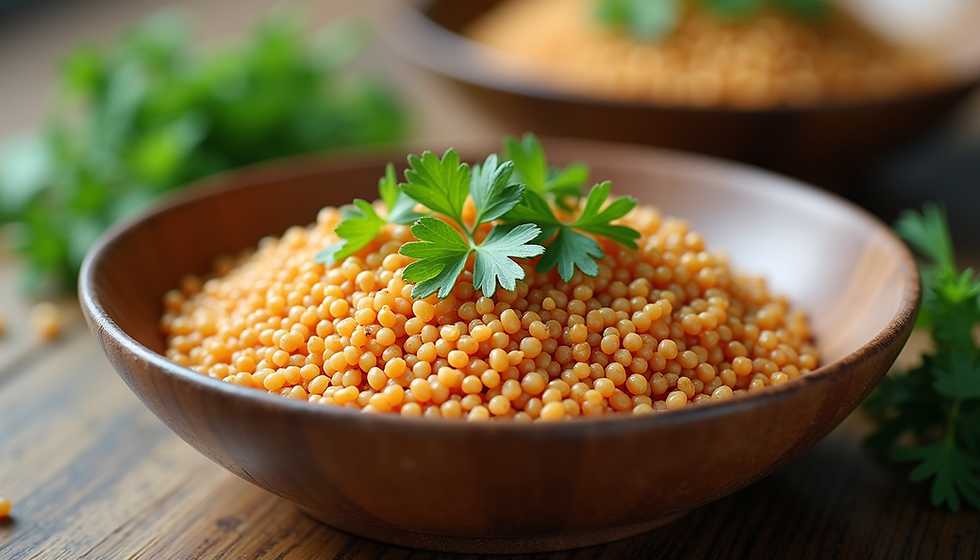Why This Ancient Superfood Okra Deserves a Place on Your Plate
- Kristina TOSEVSKA

- Aug 5, 2025
- 3 min read
Okra, often called "ladies' fingers," is a fascinating fruit with a rich history that spans over 5,000 years. Originating in the Nile Valley, this ancient superfood not only adds flavor to meals but also offers numerous health benefits. It can help regulate blood sugar, improve skin health, and more. Let’s explore why okra should find a regular spot in your kitchen.
The Nutritional Powerhouse
One of the key reasons to add okra to your diet is its nutritional punch. This green fruit is rich in essential vitamins and minerals:
Vitamins: It is high in vitamin C (21% of the daily value in a one-cup serving), which boosts your immune system, and vitamin K (about 26% of daily value), vital for blood clotting and bone health.
Minerals: It also contains magnesium, which supports muscle function, and potassium, which helps regulate blood pressure.
In addition to this, okra is low in calories with only about 33 calories per cup, making it an excellent choice for weight management while ensuring you’re getting essential nutrients.
The Medicinal Marvel
Okra's benefits extend beyond nutrition. It has been recognized in traditional medicine for its ability to help control blood sugar levels, which can be particularly helpful for people with diabetes. The polysaccharides found in okra may improve glucose metabolism.
Further, this unique fruit can play a role in heart health. The soluble fiber in okra can bind with cholesterol, potentially lowering levels in the bloodstream. Studies suggest that a diet high in soluble fiber can reduce total cholesterol by about 13%.
A Natural Remedy for Respiratory Health
If you or someone close to you deals with asthma or other respiratory issues, okra might be worth considering. Its rich content of antioxidants and anti-inflammatory compounds could help reduce irritation in the airways, making breathing easier. Folklore even suggests that regular consumption of okra may lessen the severity of asthma symptoms. While okra should not replace prescribed medications, adding it to your diet could be beneficial for overall respiratory support.

Gut Health Champion
Okra is a great ally for your gut due to its high fiber content. One cup of cooked okra provides about 4 grams of fiber, which is 14% of the daily recommended intake. A fiber-rich diet can support regular bowel movements and foster a healthy gut microbiome by acting as a prebiotic, feeding beneficial bacteria in your intestines.
Moreover, okra’s unique mucilaginous texture helps soothe the gut lining, which can be particularly comforting for individuals with stomach sensitivity or conditions like acid reflux.
Skin Regeneration Benefits
Okra also holds promise for skin health. Its high levels of vitamins and antioxidants make it effective in battling skin issues. In many cultures, okra has been used in beauty routines for centuries. Its anti-inflammatory properties can alleviate redness and irritation, while the nutrients encourage healthy skin cell regeneration.
You can enjoy okra in homemade beauty masks, offering an all-natural alternative to harsh chemicals. For instance, blending okra with aloe vera and honey creates a hydrating treatment for radiant skin.
Culinary Versatility
Another compelling reason to love okra is its versatility in cooking. This fruit can be enjoyed in many forms and types of dishes. Here are some ideas for using okra in your meals:
Boiled or Stewed: It works well in stews and soups, where its texture can meld with other ingredients.
Raw in Salads: Sliced okra can add a fun crunch to salads.
Fried: For a crispy treat, coat sliced okra in cornmeal and fry until golden brown.
Gumbo: A staple in Southern cooking, adding okra to gumbo enhances its flavor and thickens the dish.
You can also try marinating, drying, or even grinding into a spice mix, offering countless possibilities to explore.
Easy Tips for Cooking Okra
If you’re excited to try okra, here are some helpful tips:
Choose the Right Pod: Look for firm, bright green pods that are free of blemishes. Smaller pods usually taste better and have a tender texture.
Prepare Properly: Rinse the okra under cold water and dry it thoroughly before cooking to minimize the sliminess that some people dislike.
Use Acidic Ingredients: Cooking with tomatoes or vinegar can reduce the slimy texture and enhance flavor.
Dry Roasting: Baking or roasting okra is a fantastic way to create a crispy snack without the sliminess.
Embrace This Ancient Superfood
Okra has a rich history and numerous health benefits, making it a worthy addition to your meals. It is rich in vitamins and minerals, has medicinal properties, and is incredibly versatile in the kitchen.
So, the next time you plan your meals, think about incorporating okra. Whether you’re preparing a hearty stew, a fresh salad, or a crunchy snack, adding this remarkable fruit could significantly contribute to your health and delight your taste buds.



Comments